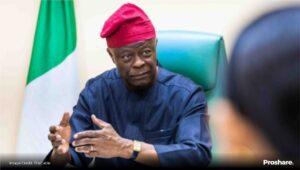We need to increase investment in infrastructure — CIBN
By Philemon Adedeji
The Chartered Institute Bankers of Nigeria (CIBN), has said Nigeria needs to increase investment in infrastructure to widely emphasize sustainable development and the clean energy transition and post-pandemic economic recovery.
The President/Chairman of the Council, Ken Opara made this statement at the 2022 occasion of CIBN fellowship investiture themed, “Bridging the infrastructure Deficit:The role of financial institution,” held in Lagos at the weekend.
While speaking at the occasion, he said, “Over the years, the public infrastructure deficit in Nigeria has become an issue of major concern.”
Generally, infrastructure is the foundation on which economic activities thrive.
According to the Africa Infrastructure Country Diagnostic Report released in 2011 titled “Nigeria Infrastructure: A Continental Perspective”, about 40 per cent of the productivity are caused by infrastructure constraints. There is therefore no doubt that the dearth of key infrastructure in several sectors of the economy has continued to limit Nigeria’s growth potential and its competitive abilities globally.
This infrastructure gap includes inadequate railway, poor road network, that can drive economic activities, poor drainage and water dredging system, port logistics and in some instances, non-existent power generation, transmission, and distribution systems, decaying public educational facilities, dilapidated government-owned hospitals (including tertiary healthcare facilities), and airports, amongst others.
Currently, the infrastructure deficit in Nigeria is put at $3 trillion.The Nigeria’s infrastructure report details show that deficit and projects need for an investment of about $32 billion year-on-year, through 10 years, for the country to bridge its huge infrastructure gaps.
Also, the Minister of Finance, Budget, and National Planning, Hajiya Zainab Ahmed, said Nigeria will need around $2.3 trillion over the next 21 years to make up for its infrastructure deficiencies.
Clearly, it is near impossible to expect the government to foot the entire bill. The approach adopted by the government in tackling infrastructure challenges over the years has largely been through a combination of budgetary allocation augmented by foreign and domestic debts. This approach partly accounts for the continued rise in Nigeria’s debt profile resulting in increased cost of debt servicing to the country. In this regard, there are serious concerns that project financing mainly through debt is not sustainable in the long run.
The question then is, with competing needs and dwindling resources, how can Nigeria create its industrial revolution? How can Nigeria fund the interstate road networks, railroads, electricity transmission lines, electricity distribution infrastructure, dams, sewage systems and other critical infrastructure, to spur job creation, a robust economy and improved standard of living for Nigerians?
These are difficult conversations to have but they are necessary. However, the answer lies in adopting new thinking, attitude, aptitude, and approach towards unlocking the required funding for economically viable public infrastructure projects.
A good place to start is for government to have a good financial model and a strong regulatory platform in place so that financial institutions can commit funds to Public Private Partnerships (PPP) to fund infrastructure development. Also, to create jobs and leapfrog growth and development, project lifecycles must be shortened, partners must be assured of their benefits without interference from successive governments, projects must be rid of conflict of interests, and minimum resistance from end users.
It is note worthy to mention that amidst the ongoing efforts to tackle this challenge, the Central Bank of Nigeria (CBN) announced the creation of the Infrastructure Corporation (InfraCorp) in October 2021 (after it was approved by the President in February 2021) to boost funding for capital projects in the country.
The InfraCorp was established by the CBN in partnership with African Finance Corporation (AFC) and the Nigerian Sovereign Investment Authority (NSIA).
The activities of InfraCorp are expected to result in increased Foreign Direct Investment (FDI) in the Nigerian economy and an improved business environment.
“I must say that this is quite a remarkable initiative, and it is hoped the organization would bridge the infrastructural gaps in Nigeria today.”
He sincerely appreciated the esteemed guest speaker, Mr. Opuiyo Oforiokuma, Senior Partner, Africa50 Infrastructure Acceleration Fund, who has accepted to share with us extensive insights as he speaks to the ongoing efforts as well as the role of financial institutions in bridging infrastructure deficit in Nigeria. I earnestly look forward to this enlightening session and I encourage you all to be focused to get the most out of this event.
Fellowship Investiture is a statutory annual event where the highly esteemed fellowship status of the Institute is conferred on deserving members who have meritoriously distinguished themselves while making notable contributions to the success of the Institute, their respective organizations and the economy as a whole.
“The Honorary Fellowship of the Institute is also conferred on very deserving non-members of the Institute that contributed significantly to the growth of the economy and whose nominations are approved by the Governing Council of the Institute. This year, we are proud to honour 22 Honorary Fellows, 143 Elected Fellows and 244 Honorary Senior Members.
In conclusion, I congratulate all awardees on this milestone achievement, while using this opportunity to encourage you to use your new status and exemplary character as a shining beacon for the Nigerian banking industry and beyond.”




